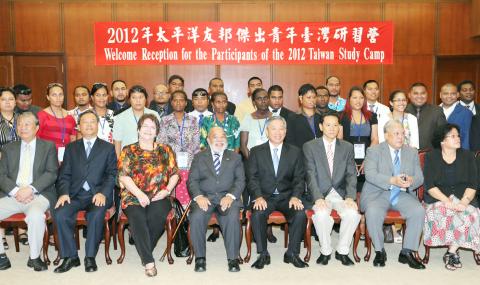A group of representatives from diplomatic allies in the Pacific is visiting Taiwan to learn more about the nation’s development, as part of the country’s cultural diplomacy, the Ministry of Foreign Affairs said yesterday.
Twenty-eight people from Kiribati, Nauru, Palau, Marshall Islands, Solomon Islands and Tuvalu are taking part in a “Taiwan Study Camp,” in which they will attend seminars on Taiwan-China ties, democracy, economy, healthcare and a variety of other topics, the ministry said.
Participants in the 10-day camp that began on Monday will also meet Taiwanese who have taken part in “youth ambassador” programs overseas, said James Tien (田中光), director-general of the ministry’s Department of East Asian and Pacific Affairs.

Photo: CNA
Among the participants, all of whom are visiting Taiwan for the first time, is Jacob -Yangilmau, governor of Sonsorol State in Palau.
The seminars are helping him learn about the development of Taiwan’s democracy and economy, Yangilmau said, adding that they are useful experiences for his position as a state governor.
Asked about what has impressed him the most about Taiwan, Yangilmau cited Taiwan’s transport infrastructure and the hospitality of the people.
“Since the camp kicked off on Monday, we’ve gained a better sense of Taiwan’s economic and cultural achievements,” said Denise de Brum, a participant from the Marshall Islands.
Other participants in the camp include government officials at the middle and entry levels, members of the media and business representatives.
They are scheduled to visit a vegetable center, the Council of Agriculture’s Fisheries Research Institute, Konta Integrated Network Engineering Co, the National Center for Traditional Arts and the World Vision Taiwan charity group, the ministry said.
Initiated in 2010, the camp aims to strengthen ties of friendship between Taiwan and its Pacific allies and to increase understanding of Taiwan, according to the ministry.

Taiwanese can file complaints with the Tourism Administration to report travel agencies if their activities caused termination of a person’s citizenship, Mainland Affairs Council Minister Chiu Chui-cheng (邱垂正) said yesterday, after a podcaster highlighted a case in which a person’s citizenship was canceled for receiving a single-use Chinese passport to enter Russia. The council is aware of incidents in which people who signed up through Chinese travel agencies for tours of Russia were told they could obtain Russian visas and fast-track border clearance, Chiu told reporters on the sidelines of an event in Taipei. However, the travel agencies actually applied

New measures aimed at making Taiwan more attractive to foreign professionals came into effect this month, the National Development Council said yesterday. Among the changes, international students at Taiwanese universities would be able to work in Taiwan without a work permit in the two years after they graduate, explainer materials provided by the council said. In addition, foreign nationals who graduated from one of the world’s top 200 universities within the past five years can also apply for a two-year open work permit. Previously, those graduates would have needed to apply for a work permit using point-based criteria or have a Taiwanese company

The Shilin District Prosecutors’ Office yesterday indicted two Taiwanese and issued a wanted notice for Pete Liu (劉作虎), founder of Shenzhen-based smartphone manufacturer OnePlus Technology Co (萬普拉斯科技), for allegedly contravening the Act Governing Relations Between the People of the Taiwan Area and the Mainland Area (臺灣地區與大陸地區人民關係條例) by poaching 70 engineers in Taiwan. Liu allegedly traveled to Taiwan at the end of 2014 and met with a Taiwanese man surnamed Lin (林) to discuss establishing a mobile software research and development (R&D) team in Taiwan, prosecutors said. Without approval from the government, Lin, following Liu’s instructions, recruited more than 70 software

Chinese spouse and influencer Guan Guan’s (關關) residency permit has been revoked for repeatedly posting pro-China videos that threaten national security, the National Immigration Agency confirmed today. Guan Guan has said many controversial statements in her videos posted to Douyin (抖音), including “the red flag will soon be painted all over Taiwan” and “Taiwan is an inseparable part of China,” and expressing hope for expedited reunification. The agency last year received multiple reports alleging that Guan Guan had advocated for armed reunification. After verifying the reports, the agency last month issued a notice requiring her to appear and explain her actions. Guan